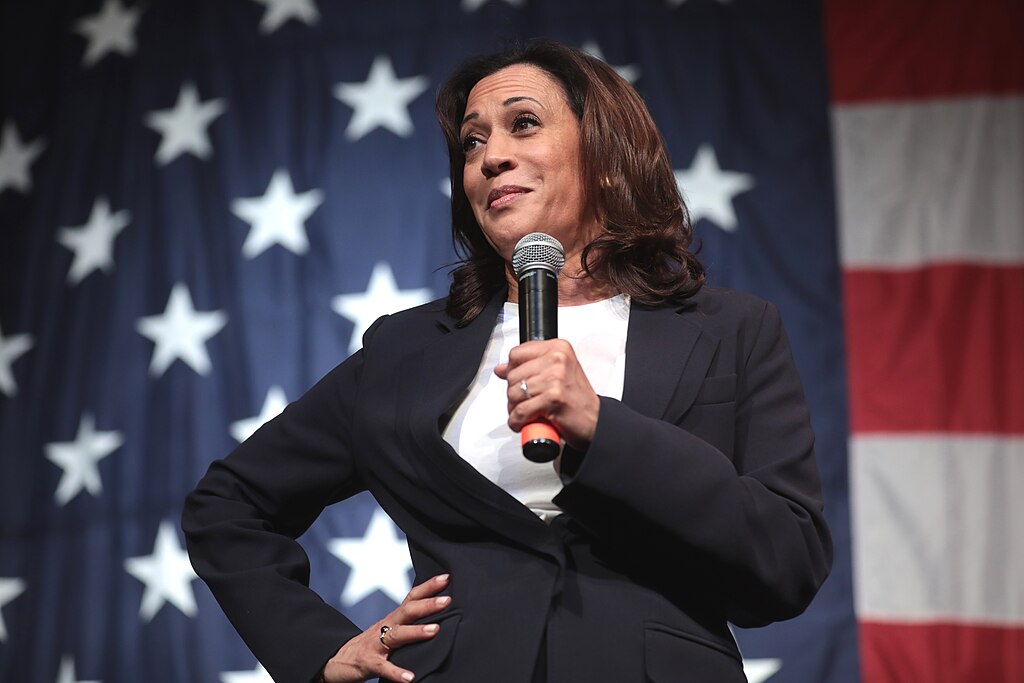In a development that has ignited fresh controversy in the lead-up to the 2024 presidential debates, a senior adviser to Donald Trump has accused Vice President Kamala Harris of attempting to alter the debate format to avoid facing the former president under traditional rules. According to Danielle Alva, a prominent figure in Trump's campaign, Harris's team is reportedly pushing for changes that include allowing her to be seated during the debate and the use of notes, fueling speculation that her campaign is concerned about her performance in a head-to-head confrontation with Trump.
These allegations come as the political climate intensifies with both campaigns preparing for what is expected to be one of the most closely watched and contentious elections in modern American history. The claim that Harris is seeking to modify the established debate rules to avoid going unscripted has prompted criticism from Trump supporters and added fuel to the ongoing rivalry between the two candidates.
Harris's team has not officially responded to these allegations, but the controversy surrounding the debate rules has quickly become a focal point for political commentators. Some observers argue that the request for changes suggests a lack of confidence on Harris's part, while others contend that such modifications could level the playing field and ensure a more substantive debate on the issues facing the nation.
The Trump campaign has seized upon this narrative, portraying Harris as being overly cautious and unwilling to engage in the kind of direct, unscripted exchanges that have characterized previous presidential debates. This aligns with their broader strategy of casting Trump as a more authentic and spontaneous candidate, in contrast to what they describe as Harris's scripted and controlled approach.
The debate format itself has long been a subject of contention in American politics, with candidates and their teams often negotiating the rules and structure in the run-up to the events. However, the suggestion that a candidate might seek to change fundamental aspects of the debate, such as the ability to stand and engage directly with their opponent, has added an unusual layer of drama to this election cycle.
As the date of the debates approaches, it remains to be seen whether Harris's camp will address these allegations or if the debate commission will entertain any proposed changes to the format. The potential implications for the debates are significant, as the format could influence public perception of the candidates and their ability to handle the pressures of the presidency.
The controversy underscores the high stakes of this election, where every move is scrutinized, and every decision could have far-reaching consequences. For now, the focus is on whether Harris will confront Trump under the traditional debate rules or whether her campaign will succeed in negotiating the modifications they are reportedly seeking.



 Trump Announces U.S. Strikes on Iran Navy as Conflict Escalates
Trump Announces U.S. Strikes on Iran Navy as Conflict Escalates  Trump Warns Iran as Gulf Conflict Disrupts Oil Markets and Global Trade
Trump Warns Iran as Gulf Conflict Disrupts Oil Markets and Global Trade  U.S. Lawmakers Question Trump’s Iran Strategy After Joint U.S.-Israeli Strikes
U.S. Lawmakers Question Trump’s Iran Strategy After Joint U.S.-Israeli Strikes  Trump Says U.S. Attacks on Iran Will Continue, Warns of More American Casualties
Trump Says U.S. Attacks on Iran Will Continue, Warns of More American Casualties  Russia Signals Openness to U.S. Security Guarantees for Ukraine at Geneva Peace Talks
Russia Signals Openness to U.S. Security Guarantees for Ukraine at Geneva Peace Talks  Trump Orders Federal Agencies to Halt Use of Anthropic AI Technology
Trump Orders Federal Agencies to Halt Use of Anthropic AI Technology  Iran Supreme Leader Ayatollah Ali Khamenei Killed in Israeli, U.S. Strikes: Reuters
Iran Supreme Leader Ayatollah Ali Khamenei Killed in Israeli, U.S. Strikes: Reuters  Pentagon Leaders Monitor U.S. Iran Operation from Mar-a-Lago
Pentagon Leaders Monitor U.S. Iran Operation from Mar-a-Lago  EU Urges Maximum Restraint in Iran Conflict Amid Fears of Regional Escalation and Oil Supply Disruption
EU Urges Maximum Restraint in Iran Conflict Amid Fears of Regional Escalation and Oil Supply Disruption  Trump to Address Nation as U.S. Launches Strikes in Iran, Axios Reports
Trump to Address Nation as U.S. Launches Strikes in Iran, Axios Reports  Trump Media Weighs Truth Social Spin-Off Amid $6B Fusion Energy Pivot
Trump Media Weighs Truth Social Spin-Off Amid $6B Fusion Energy Pivot  HHS Adds New Members to Vaccine Advisory Panel Amid Legal and Market Uncertainty
HHS Adds New Members to Vaccine Advisory Panel Amid Legal and Market Uncertainty  Germany and China Reaffirm Open Trade and Strategic Partnership in Landmark Beijing Visit
Germany and China Reaffirm Open Trade and Strategic Partnership in Landmark Beijing Visit  Trump Launches Operation Epic Fury: U.S. Strikes on Iran Mark High-Risk Shift in Middle East
Trump Launches Operation Epic Fury: U.S. Strikes on Iran Mark High-Risk Shift in Middle East  Israel Launches Fresh Strikes on Iran After Death of Supreme Leader Ayatollah Khamenei
Israel Launches Fresh Strikes on Iran After Death of Supreme Leader Ayatollah Khamenei  Pentagon to Halt Ivy League Programs for U.S. Military Officers Starting 2026
Pentagon to Halt Ivy League Programs for U.S. Military Officers Starting 2026  Israel Declares State of Emergency as Iran Launches Missile Attacks
Israel Declares State of Emergency as Iran Launches Missile Attacks 































